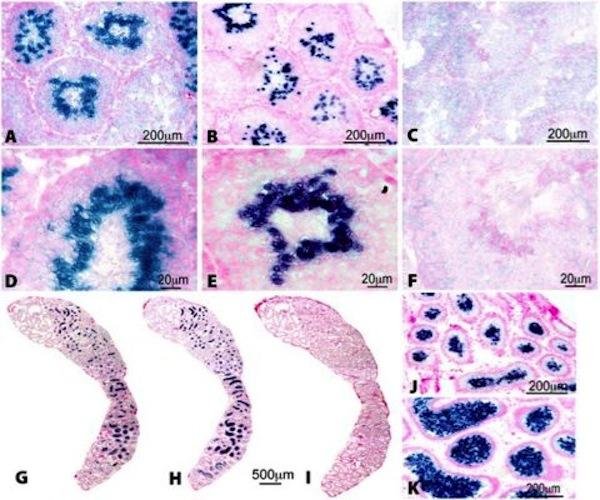Taste sensors are stained dark in these images of seminiferous tubules and epididymides in male mouse testes. (Credit: Mosinger, et. al, PNAS, 2013)
Taste receptors are proteins that tell us whether something is sweet, salty, or bitter, and recently researchers have found these receptors all over our bodies, including in our intestines, lungs, brain and anus.
When researchers at the Monell Chemical Senses Center in Philadelphia attempted to develop mice without sweet and umami (pleasantly savory) receptors for a taste-related study, they quickly found that mice lacking those receptors were unable to reproduce.
After conducting further studies, they found that removing these receptors from the testes -- or simply blocking their function -- rendered the mice infertile.
Breeding experiments determined that fertility was affected only in males. Both taste proteins had previously been found in testes and sperm, but until now, their function there was unknown.
In order to explore the reproductive function of the two proteins, the research team engineered mice that were missing genes for the mouse versions of TAS1R3, a component of both the sweet and umami (amino acid) taste receptors, and GNAT3, a molecule needed to convert the oral taste receptor signal into a nerve cell response.
Instead the mice expressed the human form of the TAS1R3 receptor. These mice were fertile.
When the human TAS1R3 receptor was blocked in the engineered mice by adding the drug clofibrate -- commonly used to treat lipid disorders such as high blood cholesterol or triglycerides -- the males became sterile due to malformed and fewer sperm.
Noting the common pharmacological use of fibrates and also the widespread use of structurally similar phenoxy-herbicides, which also block the human TAS1R3 receptor, lead author Bedrich Mosinger, MD, PhD, a molecular biologist at Monell, speculates that these compounds could be negatively affecting human fertility.
The authors suspect the sweet and umami receptors are vital to detecting sugars and amino acids outside the taste system, both of which are connected to sperm production.
The findings, published in the Proceedings of the National Academy of Sciences, represent possibilities to affect fertility in both directions -- as a contraceptive or to restore fertility.
“If our pharmacological findings are indeed related to the global increase in the incidence of male infertility, we now have knowledge to help us devise treatments to reduce or reverse the effects of fibrates and phenoxy-compounds on sperm production and quality," Mosinger said. "This knowledge could further be used to design a male non-hormonal contraceptive.”















